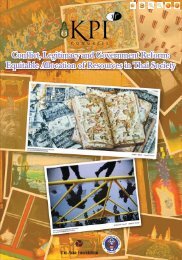SUFFiciENcy EcONOMy ANd GRASSROOtS DEvElOPMENt
SUFFiciENcy EcONOMy ANd GRASSROOtS DEvElOPMENt
SUFFiciENcy EcONOMy ANd GRASSROOtS DEvElOPMENt
You also want an ePaper? Increase the reach of your titles
YUMPU automatically turns print PDFs into web optimized ePapers that Google loves.
The Meaning of Sufficiency Economy <br />
International Conference<br />
207<br />
prevention patrol groups, community ecologists groups to saving groups to<br />
occupation groups of seedling, herbal medicine, wine maker group, bio-diesel group<br />
and others. <br />
According to rural Isaan community context, the sense of social trust is<br />
expressed in the way their houses are set up. People who live in the same village<br />
know each other. Most of the houses are elevated one floor houses with an open<br />
ground area. The area is used as the multi-purpose space. It can be interchangeably<br />
utilised as a dining area, living space, greeting area, meeting hall or even as a<br />
children’s play ground. The rough fences around village houses are for preventing<br />
animals, such as cattle and stray dogs, not people, to enter the area. It is a common<br />
tradition to talk to strangers entering the village. After knowing each other, it is also<br />
very common to call the strangers for a dinner. This trust issue can be observed<br />
through the Inpaeng training courses. The accommodation area in Inpaengcentre can<br />
host up to thirty trainees. However, if there are more trainees who are participated in<br />
a 3-day training program, they would spend their nights in villagers’ houses around<br />
the centre. It can be assumed by the evidence above that the level of people trust in<br />
the area of study is high.<br />
Many Inpaeng leaders gain trust from the members. Although some of the<br />
Inpaeng leaders are also public authorities such as village headmen or Tambon<br />
headmen, but a large number of them are not.<br />
This study found that concern with the young generations is an important<br />
issue. These concerns can be categorised into two groups. Firstly, it is a worry about<br />
reckless behaviours of youngsters living in the villages. The issues of drunk driving,<br />
motorcycle racing, drugs, sexual misbehavior and gangs fighting in the young<br />
generation were concerned by the older adults. When asked what factors contributed<br />
to the violence in the village, many of the participants referred to “those<br />
youngsters”. Concerned by this issue, the Inpaeng network has some constructive<br />
programs established for the younger generations to keep them from those risk<br />
behaviours.<br />
The “Dekhak Tin” (Thai: เด็กฮักถิ่น)or “kids love homeland” program was<br />
initiated by the Inpaeng network. The program trained the local adolescents to<br />
understand the interconnectedness between the trainees and their ecosystem. A<br />
project showing that everything is intertwined with everything was introduced. <br />
A program called “Inpaeng community ecologists training” aimed to draw the<br />
young adult generation back from working as cheap labour in big cities, to<br />
sustainable, self-reliance farming in their hometown.<br />
The research field note below describes Inpaeng community ecologists are as<br />
follows:














